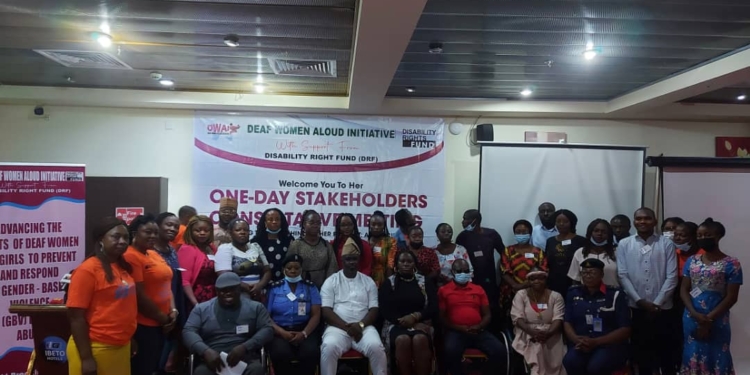Deaf Women Aloud Initiative (DWAI), an NGO that advances the rights of Deaf women and girls in Nigeria, has launched a project titled, ‘Advancing the Rights of Deaf Women and Girls in Nigeria’.
According to the Executive Director of DWAI, Mrs Hellen Beyioku-Alase, the project aims to raise awareness and consciousness about Deaf women and girls.
She stated this at the one-day stakeholders’ meeting to mark the launch of the project.
Mrs Beyioku-Alase noted that one of the major obstacles preventing Deaf women from achieving full justice on the issue of gender-based violence is their invisible disability of hearing impairments which makes it hard for them to report cases.
Earlier in her opening speech, the Hon Minister of Women Affairs, Dame Pauline Tallen, represented by the Assistant Chief Social Welfare Officer, Mrs Gloria Onwuzinke, noted that there is still a wide gender gap in economic issues opportunities and growth.
She stated that there is an urgent need to bridge the communication gap between deaf women and others in various sectors in Nigeria.
She revealed that the Federal Ministry of Women Affairs in collaboration with the Federal Ministry of Humanitarian and Disaster Management in mid-2020 trained about 45 social workers on sign language and interpretations.
“It is imperative to ensure that the rights of deaf women and girls in Nigeria are protected, especially amongst health workers when they seek to access sexual and reproductive health services,” she added.
On her part, the DWAI ED said, “We hope that at the end of this project, we will be able to produce a comprehensive training manual on gender-based violence for deaf women and young girls in Nigeria.
She called on the government, non-governmental organizations and the international community to ensure full participation with sign language, noting that “nothing about us without us”.
“Include Deaf women in service delivery for a better inclusive society,” Beyioku-Alase added.
Advancing the Rights of Deaf Women and Girls in Nigeria project is a one year project funded by the Disability Rights Fund (DRF).

